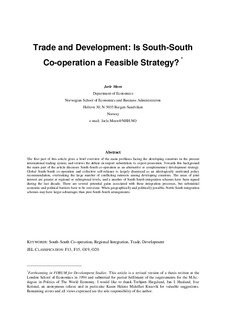Trade and development : is south-south co-operation a feasible strategy?
Working paper
Permanent lenke
http://hdl.handle.net/11250/163008Utgivelsesdato
1998-10Metadata
Vis full innførselSamlinger
- Discussion papers (SAM) [657]
Sammendrag
The first part of this article gives a brief overview of the main problems facing the developing countries in the present
international trading system, and reviews the debate on import substitution vs. export promotion. Towards this background
the main part of the article discusses South-South co-operation as an alternative or complementary development strategy.
Global South-South co-operation and collective self-reliance is largely dismissed as an ideologically motivated policy
recommendation, overlooking the large number of conflicting interests among developing countries. The areas of joint
interest are greater at regional or subregional levels, and a number of South-South integration schemes have been signed
during the last decade. There are several potential gains associated with these integration processes, but substantial
economic and political barriers have to be overcome. When geographically and politically possible, North-South integration
schemes may have larger advantages than pure South-South arrangements.
Utgiver
Norwegian School of Economics and Business Administration. Department of EconomicsSerie
Discussion paper1998:21
